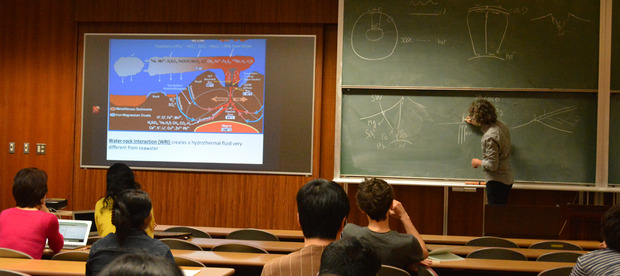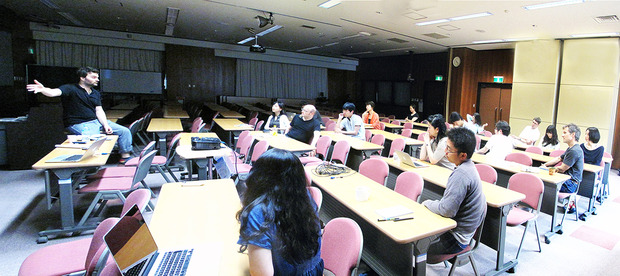ELSI Blog
100 Going Back to School at ELSI
 As anyone can easily imagine, the mission of ELSI --studying the Origin of Earth and Life-- cannot be done by one single science. Therefore, interdisciplinarity is a key to achieving our goal. Everything at ELSI, from the activities down to the architectural layout of the new building, is built around giving scientists from different fields opportunities to meet each other and exchange ideas. Imagine having astronomers, geologists, biologists, computer scientists, theorists, chemists, etc. working together. Very few can follow the meaning of all the discussions that are going around in this building. Very very few indeed.
As anyone can easily imagine, the mission of ELSI --studying the Origin of Earth and Life-- cannot be done by one single science. Therefore, interdisciplinarity is a key to achieving our goal. Everything at ELSI, from the activities down to the architectural layout of the new building, is built around giving scientists from different fields opportunities to meet each other and exchange ideas. Imagine having astronomers, geologists, biologists, computer scientists, theorists, chemists, etc. working together. Very few can follow the meaning of all the discussions that are going around in this building. Very very few indeed.
After discussing the challenges of interdisciplinary sharing with some colleagues, we realized that the interactions between ELSI members would be much stronger if we had some forum for mutual education across scientific fields.
When most of us attend research-level seminars in a discipline that is far from our own, lacking basic vocabularies and concepts are the main limitations for understanding the talks and discussions.
The idea of "ELSI Youchien" grew from this realization, and we saw that these limitations could be removed (or at least be lessened!) by gathering and educating ourselves and each other - in a relaxing atmosphere. It should be mentioned here that 'Youchien', 幼稚園, is the Japanese word for 'kindergarten'. We wanted to create a supportive entry-level space for learning, where as much is learned through the basic questions from the group as from the lectures themselves.
The concept is very simple: one ELSI member makes a presentation on a basic topic for which he or she is not necessarily a specialist. This last point is very important since we wanted to make things very basic and understandable for everyone, even including the non-scientific administrative staff.
We kicked off ELSI Youchien in mid May, with Julien Foriel and Alexis Gilbert respectively running the first two classes which took place two weeks apart. Julien-sensei taught us how hydrothermal springs are formed, what are the general characteristics of the two major types of deep sea hydrothermal vents, what ecosystems they support now and how they may have contributed to the origin of life. Alexis-sensei taught us what it means for living organisms to maintain life and about the necessity of carbon and energy supplies, about autotrophs and heterotrophs, the further distinctions of chemoautotrophs, chemohetereotrophs, photoautotrophs, and photoheterotrophs. In each of the classes, about fifteen kindergarteners of all ages, scientists from all fields and non-scientists alike, voluntarily sat down to learn.
The Youchien is an experiment and we hope it will grow and evolve with the needs of our community. There is a lot to discover across all fields and we are excited about what we may learn about metabolism of living organisms, plate tectonics or exoplanets in future Youchien classes.
********************************************************************************
Below are some comments collected from the participants of ELSI Youchien:
"I think the Youchien is one of the best gatherings currently happening at ELSI. It was started by young researchers who want to be engaged with all of ELSI's broad scope of topics at a critical level, and who understand that it is not always possible for seminars on recent research results to contain enough introductory material to be understandable to non-specialists. So they created an ecology: ELSI provides its own educational resource through the Youchien, in a form that is nimble and tailored to the current active research topics. The Youchien speakers are also disciplined in keeping material at an introductory level and being open to the entire ELSI community: researchers, staff, and visitors. This keeps the focus on fundamental concepts, and on things science allows us to see in the world of everyday experience that are fascinating and beautiful. I hope we can use the Youchien as a model for other gatherings as ELSI
tries to create even further-reaching connections with other
institutions, to capture the bigger picture across all the sciences." ~Eric Smith, PI
"Since I am not a geochemist, my knowledge about 'Hydrothermal Springs' had been a collection of miscellaneous information I got from research presentations and I felt that my basic understanding of it was lacking. That is why the concept of Yochien appealed to me and I decided to join it. I am happy to learn about the historical review of hydrothermal spring as well as see a lot of actual pictures. The talk was appropriate for my level of background knowledge." ~Yuka Fujii, Research Scientist
"I attended ELSI Youchien because I wanted to know what our researchers are doing and talking about. I want to know which part of ELSI's disciplines our researchers are working on (see below) and how they connect to each other. I found the sessions very interesting though I could not understand all of it. I did learn new words such as 'black smokers', 'Lost City', 'olivine' and how they relate to hydrothermal systems. I want to thank the organizers for ELSI Youchien for teaching us!" ~Harumi Tanaka, Secretary
I found the sessions very interesting though I could not understand all of it. I did learn new words such as 'black smokers', 'Lost City', 'olivine' and how they relate to hydrothermal systems. I want to thank the organizers for ELSI Youchien for teaching us!" ~Harumi Tanaka, Secretary
"One of the best and perhaps strongest traits of ELSI is that many scientists and staff here are motivated and hands-on involved in making the place a better functioning institute, often beyond what their job contract requires of them. ELSI Youchien is a perfect example, of research scientists feeling a need and having the concern to address that need, of so many non-scientific staff showing up because they want to understand the science that the researchers they support are involved in. I must say, I love hearing scientist who are normally confident in their own areas ask questions starting with, 'This might be a stupid question...' which then triggers a series of rich exchanges basic enough for the layperson to follow. After both sessions, I found myself surprisingly tired: if this is kindergarten, then after these captivating lessons, it's time for a nap!" ~Hanako Ricciardi, Receiving Editor of ELSI Blog & Coordinator of Int'l Initiatives











